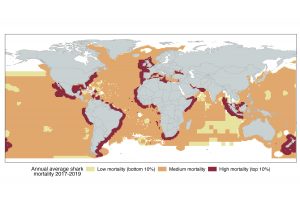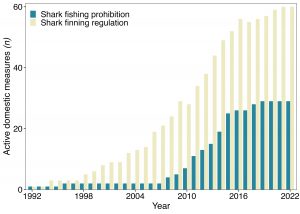Between 80 and 101 million sharks were killed in global fisheries in 2019, according to a landmark new paper led by Boris Worm of Dalhousie University. Shark mortality increased slightly between 2012 and 2019, despite a raft of shark conservation measures being introduced around the world.

Many governments have come to recognise over the past twenty years that sharks are crucial for healthy marine ecosystems but have been facing ever-higher fishing pressure. The new paper, co-funded by Blue Marine Foundation and published in Science, is the first assessment of the impact of the more than ten-fold increase in regulatory measures addressing shark fishing that were introduced between 2012 and 2019.
Many of these regulations were introduced to curb shark finning, the horrific practice of cutting the fins off sharks and throwing the rest of the carcass into the sea. While these measures have been successful in reducing the prevalence of shark finning, the requirement to land whole sharks rather than just the fins may have contributed to the development of markets for shark meat that previously did not exist.

Worryingly, fisheries have begun catching more small sharks, including juveniles. This is partly a response to the higher demand for shark meat, but is also an indication of declining populations of larger sharks.
The Indian Ocean and Indo-Pacific are primary areas of concern for shark bycatch. While mortality hotspots are generally concentrated in coastal waters, some species like silky sharks are mainly fished in pelagic environments.
Boris Worm, lead author of the study and a Research Professor in the Department of Biology at Dalhousie, said: “We show that widespread legislation designed to prevent shark finning was successful in addressing this wasteful practise but did not reduce mortality overall. Too many sharks are dying; this is especially worrisome for threatened species such as hammerhead sharks”.
There are sign of hope, however. Some areas have introduced regulations that prevent the landing of either threatened or all shark species. These measures provide much stronger protection than those related to shark finning, and the paper found that they are often associated with reductions in shark mortality.
Small island nations have been leading the way forward on successful shark conservation. Shark sanctuaries in the Maldives and Bahamas have led to healthy shark populations, which in turn promote shark-related tourist economies.
Jess Rattle, Head of Investigations at Blue Marine Foundation, said: “This important piece of work highlights the fact that shark fishing regulations have been insufficient over the past decade. National governments and RFMOs need to move quickly to introduce meaningful protections through wider shark fishing prohibitions and marine protected areas, so that these critical species are given the opportunity they need to recover from intolerably high fishing pressure”.
Read the paper published in Science today: https://www.science.org/doi/10.1126/science.adf8984


















